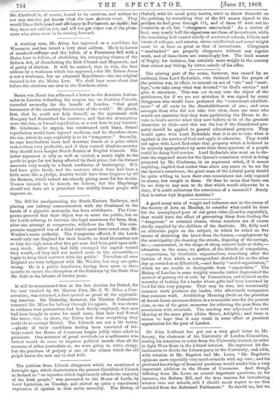A good many men of weight and influence met at
the rooms of the Society of Arts on Monday, to consider what could be done for the unemployed poor of our great cities (London especially), that would have the effect of preventing them from feeding the " dangerous " or criminal classes, whose numbers are of course chiefly supplied by the children of the destitute. Mr. Solly read an elaborate paper on the subject, in which he relied on five means of detaching the latter from the former,—employment by the municipality (in cleaning the streets, disposing of the sewage, &c.),—amusement, in the shape of cheap concert halls or clubs,— education in the sense, we gather, of the friends of compulsion, —supervision, by charitable organizations, something after the fashion of that which a correspondent sketched for us the other day as carried on at Elberfeldt,—and finally "social organization," which we are unable to distinguish from "supervision." The Bishop of London in some weighty remarks rather depreciated the method of getting rid of evils by Committees, and insisted on the necessity of looking for a leader whose gifts had been bestowed by God for this very purpose. That may be true, but occasionally common work produces the leader, who afterwards reorganizes that common work. Archbishop Manning dwelt on the provision of decent house accommodation at a reasonable rate for the poorest class, as one of the great measures for relieving the poor from the association with criminals. The meeting was adjourned to next Monday at the same place (John Street, Adelphi); and there is reason to hope that it may result in some effort at practical organization for the poor of London.






























 Previous page
Previous page